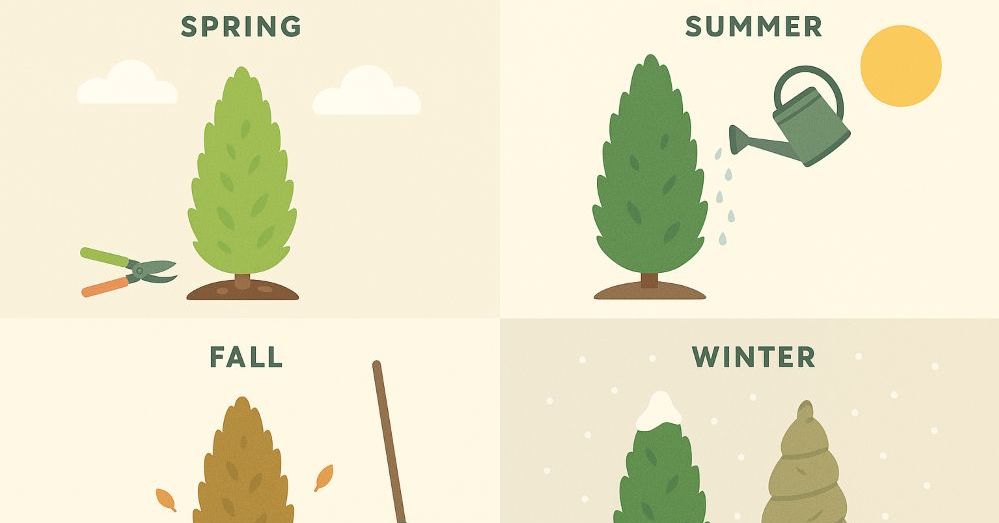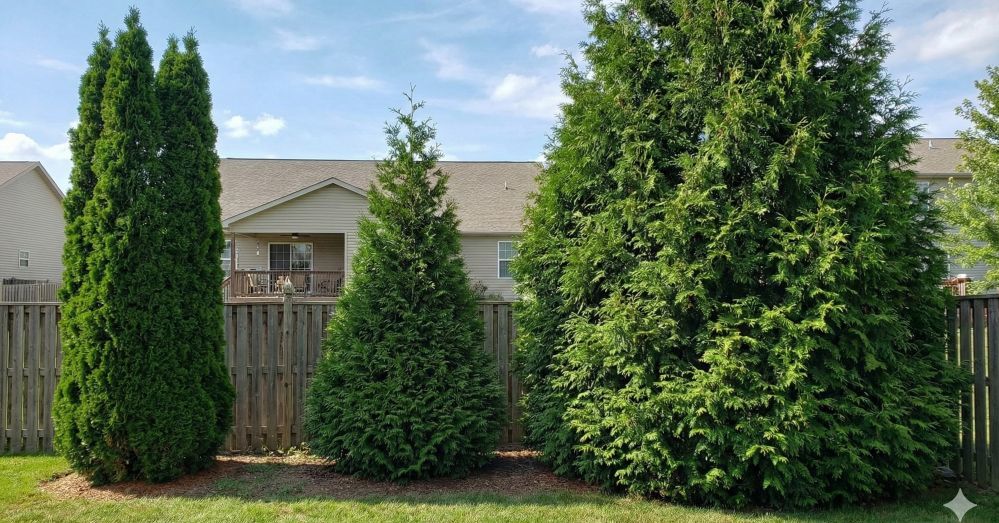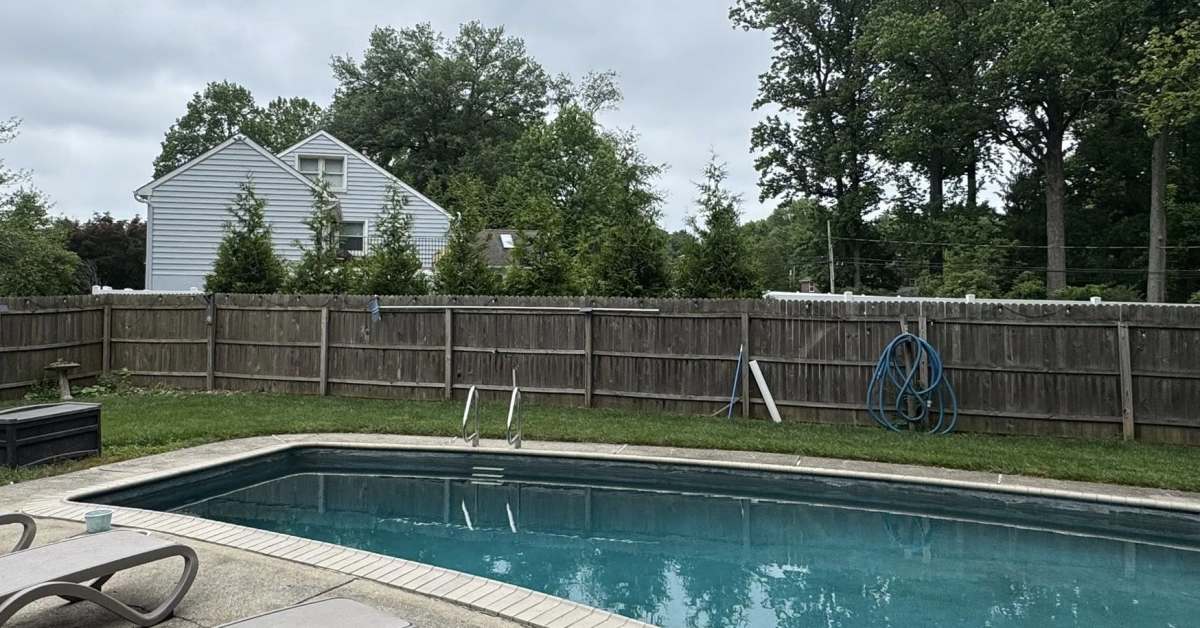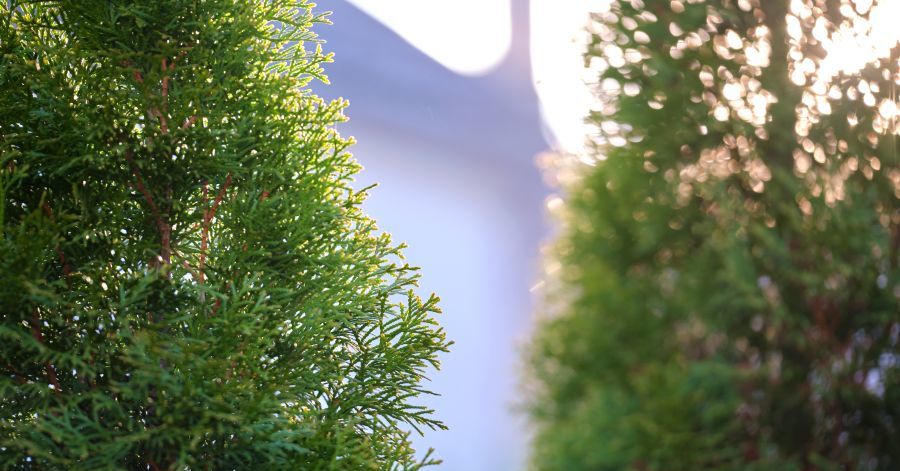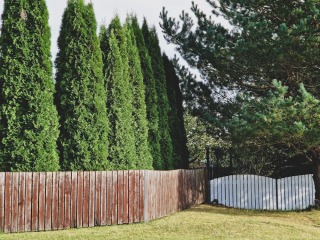
Choosing the right trees for backyard privacy is a crucial decision for any homeowner. Not only can the right trees provide a natural barrier against prying eyes, but they also add beauty, shade, and value to your property. Factors such as growth rate, maintenance, and adaptability to seasonal changes play significant roles in this selection process. In this guide, we'll explore some of the best tree options for enhancing backyard privacy, highlighting their key features, advantages, and disadvantages.
9. Forsythia (Forsythia x intermedia)
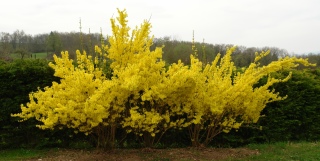
Forsythia, often heralded as the harbinger of spring, bursts into a vibrant display of golden-yellow flowers before the leaves emerge, making it one of the most anticipated blooms of the season. This deciduous shrub's bright and cheerful color palette not only signals the end of winter but also adds a splash of color to landscapes when most are still shaking off the winter dullness. Forsythia is favored for its low maintenance needs and its versatility in the landscape, serving as an excellent choice for borders, privacy screens, and ornamental focal points.
Description: A fast-growing, deciduous shrub known for its vivid yellow flowers that appear in early spring before the leaves.
Growth Rate: Fast.
Pest/Disease Resistance: Generally resistant to pests and diseases, though can occasionally be affected by leaf spot and crown gall.
Maintenance: Low; pruning immediately after flowering helps maintain shape and encourages next year’s blooms.
Deciduous/Coniferous: Deciduous.
Fragrance: The flowers are lightly fragrant, offering a subtle scent in the spring air.
Seasonal Changes: Bright yellow flowers in early Spring followed by green leaves, which may turn a yellowish or purplish color in the fall before dropping.
Advantages: Adds early spring color to the landscape; fast growth makes it a quick screen or border; adaptable to many soil types.
Disadvantages: Can become unruly if not pruned; lacks significant ornamental interest outside of its flowering period.
8. Eastern Redcedar (Juniperus virginiana)
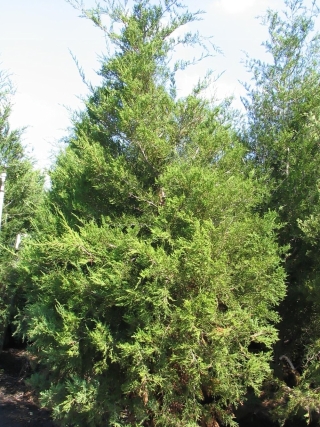
The Eastern Redcedar is a native North American gem, offering dense foliage and a sturdy, pyramidal shape that serves as an excellent privacy screen. Its ability to thrive in a variety of conditions and its pleasant cedar scent make it a favorite among homeowners. This coniferous tree is evergreen, ensuring your backyard remains secluded all year round. Despite its many benefits, potential owners should be aware of its susceptibility to certain diseases and its allelopathic nature, which can inhibit the growth of surrounding plants.
Description: A dense, coniferous tree known for its pyramidal shape.
Growth Rate: Moderate.
Pest/Disease Resistance: Resistant to most pests and diseases but can be prone to cedar-apple rust.
Maintenance: Low; drought-resistant once established.
Deciduous/Coniferous: Coniferous.
Fragrance: Has a pleasant cedar scent.
Seasonal Changes: Evergreen, providing year-round privacy.
Advantages: Durable wood, provides habitat for wildlife.
Disadvantages: Can be susceptible to certain fungal diseases; allelopathic nature might affect surrounding plant life.
7. Weeping White Spruce (Picea glauca 'Pendula')
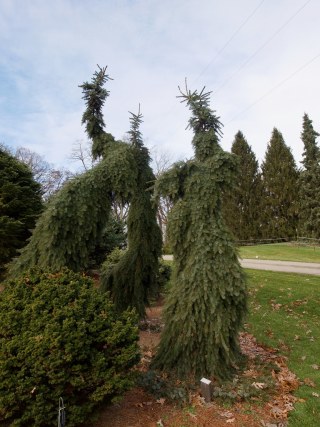
This unique tree stands tall and slender, with weeping branches that add a touch of elegance to any landscape. The Weeping White Spruce is admired for its subtle beauty, requiring minimal space to flourish, making it suitable for narrow areas. Its evergreen nature promises year-round privacy, and its resistance to most pests and diseases means less worry for the homeowner. While its growth rate is on the slower side, the visual appeal and low maintenance needs of this tree make it a worthy addition to any backyard seeking privacy and style.
Description: A tall, slender tree with weeping branches.
Growth Rate: Slow to moderate.
Pest/Disease Resistance: Good resistance overall.
Maintenance: Low; tolerates various soil types.
Deciduous/Coniferous: Coniferous.
Fragrance: Subtle, fresh spruce scent.
Seasonal Changes: Evergreen, maintaining privacy throughout the year.
Advantages: Unique visual appeal, good for narrow spaces.
Disadvantages: Slower growth rate, requires space for height development.
6. Leyland Cypress (× Cuprocyparis leylandii)
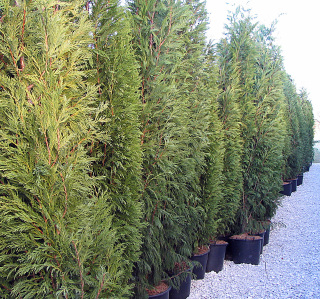
A titan in the world of privacy trees, the Leyland Cypress grows quickly to form a dense, green barrier. Its fast growth rate and tall stature make it an ideal choice for those seeking immediate privacy. However, its susceptibility to diseases and the need for regular maintenance to control its size are factors to consider. Despite these considerations, the Leyland Cypress remains a popular choice for its effectiveness as a natural sound barrier and its robust privacy capabilities.
Description: A popular, fast-growing privacy tree with dense foliage.
Growth Rate: Fast.
Pest/Disease Resistance: Vulnerable to certain pests and diseases like cypress canker.
Maintenance: Moderate; requires regular pruning to maintain shape.
Deciduous/Coniferous: Coniferous.
Fragrance: Mild, fresh scent.
Seasonal Changes: Evergreen, offering constant privacy.
Advantages: Rapid growth, effective sound barrier.
Disadvantages: Can become too large if not maintained, potential for disease.
5. Sky Pencil Holly (Ilex crenata 'Sky Pencil')
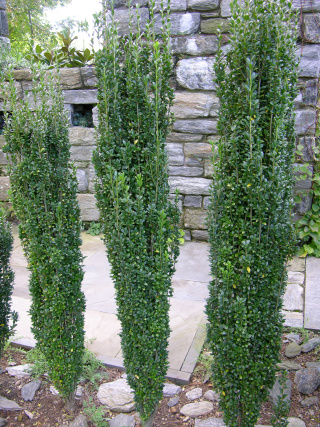
For those with limited space, the Sky Pencil Holly offers a unique, vertical solution to privacy. Its narrow form and glossy leaves can add a modern touch to landscapes, while its evergreen nature provides year-round greenery. Although it grows slowly and doesn't offer the densest coverage, its low maintenance and pest resistance make it an attractive option for small gardens or as an accent piece for privacy in specific areas.
Description: A columnar shrub with small, glossy leaves.
Growth Rate: Slow.
Pest/Disease Resistance: Good; watch for holly leaf miner.
Maintenance: Low; occasional pruning to maintain form.
Deciduous/Coniferous: Broadleaf evergreen.
Fragrance: None to mild.
Seasonal Changes: Retains leaves all year, but does not provide dense privacy.
Advantages: Great for tight spaces, unique vertical appearance.
Disadvantages: Not ideal for broad privacy needs, slow growth rate.
4. Flowering Dogwood (Cornus florida)
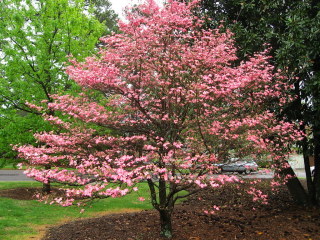
The Flowering Dogwood offers more than just privacy; it provides seasonal beauty with its springtime blooms and vibrant fall foliage. This tree's slow to moderate growth rate and susceptibility to certain pests and diseases require a bit more care and attention. However, its spectacular display and moderate privacy capabilities during the growing seasons make it a favorite for those looking to add both beauty and seclusion to their backyard.
Description: A beautiful, ornamental tree known for its spring flowers and vibrant fall colors.
Growth Rate: Slow to moderate.
Pest/Disease Resistance: Susceptible to a few diseases like dogwood anthracnose and pests like borers.
Maintenance: Moderate; requires watering during dry periods, mulching, and occasional pruning.
Deciduous/Coniferous: Deciduous.
Fragrance: Subtle, floral scent during blooming.
Seasonal Changes: Flowers in spring, leaves turn red-purple in fall, loses leaves in winter.
Advantages: Stunning spring and fall display, provides moderate privacy in growing seasons.
Disadvantages: Loses leaves in winter, reducing privacy; maintenance and disease concerns.
3. Hybrid Willow Tree (Salix spp.)
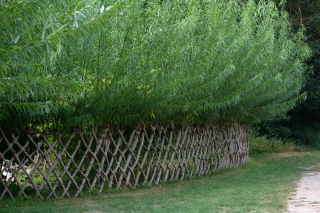
The Hybrid Willow Tree is unrivaled in its growth speed, making it an excellent choice for those seeking rapid privacy. Its dense foliage and quick establishment can provide an effective windbreak or screen in a short amount of time. However, its high maintenance requirements and potential invasiveness mean it may not be suitable for all landscapes. This tree's deciduous nature also means it will lose its leaves in winter, reducing its privacy coverage during those months.
Description: A fast-growing tree known for its dense foliage and rapid establishment.
Growth Rate: Very fast.
Pest/Disease Resistance: Variable; some species are prone to pests and diseases.
Maintenance: High; requires regular pruning and watering.
Deciduous/Coniferous: Deciduous.
Fragrance: None.
Seasonal Changes: Provides quick growth in the growing season, loses leaves in winter.
Advantages: Extremely rapid growth, effective windbreak.
Disadvantages: High maintenance, can be invasive, short lifespan.
2. Italian Cypress (Cupressus sempervirens)
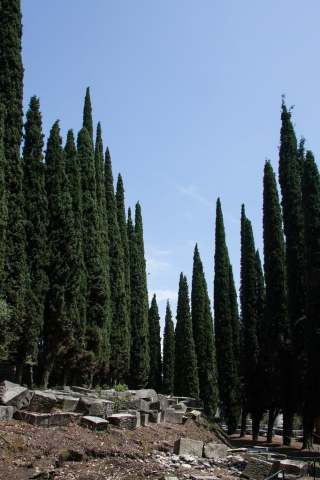
With its tall, narrow form, the Italian Cypress brings a touch of Mediterranean elegance to any yard. This evergreen tree is renowned for its moderate growth rate and minimal maintenance needs, making it a stylish and practical choice for creating privacy. Its resilience to pests and diseases adds to its appeal, although it does prefer dryer conditions to avoid issues like root rot.
Description: A tall, narrow evergreen with a striking, columnar form.
Growth Rate: Moderate.
Pest/Disease Resistance: Good; but can be affected by cypress canker in wet conditions.
Maintenance: Low; minimal pruning required.
Deciduous/Coniferous: Coniferous.
Fragrance: Mild, resinous scent.
Seasonal Changes: Evergreen, offering year-round visual interest and privacy.
Advantages: Elegant, formal appearance, ideal for Mediterranean-style landscapes.
Disadvantages: Not ideal for very wet conditions, can suffer from root rot.
1. Green Giant Arborvitae (Thuja standishii x plicata)
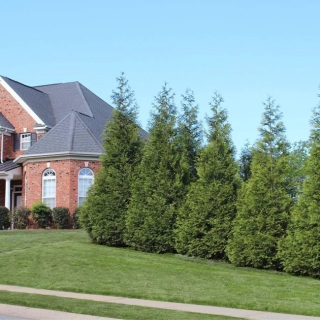
The Green Giant Arborvitae is a vigorous grower, known for its lush, green foliage and pyramidal shape. This tree is highly valued for its rapid growth and high resistance to deer, making it an excellent choice for privacy and as a windbreak. Its low maintenance and evergreen nature ensure a hassle-free, year-round screen. While it can grow quite large, proper placement and occasional pruning can help manage its size, making it a versatile option for many landscapes.
Description: A large, vigorous evergreen with a pyramidal shape.
Growth Rate: Fast.
Pest/Disease Resistance: High; especially resistant to deer.
Maintenance: Low; occasional pruning if a specific shape is desired.
Deciduous/Coniferous: Coniferous.
Fragrance: Pleasant, pine-like scent.
Seasonal Changes: Evergreen, ensuring year-round coverage.
Advantages: Quick privacy screen, tolerant of various conditions.
Disadvantages: Can grow very large, potentially overpowering in small spaces.
Selecting the right tree for backyard privacy involves balancing growth rate, maintenance needs, and aesthetic preferences. Whether you're drawn to the evergreen fortitude of the Arborvitae, the seasonal beauty of the Flowering Dogwood, or the rapid privacy provided by the Hybrid Willow, there's a tree that meets every need and style. Consider the characteristics of each tree in relation to your landscape and privacy requirements to make the best choice for your backyard sanctuary.
If you are interested in purchasing Green Giant Arborvitae trees, visit our website at https://greengianttrees.com/.
Check back for more landscaping, arboriculture, and gardening know-how!
.png)

